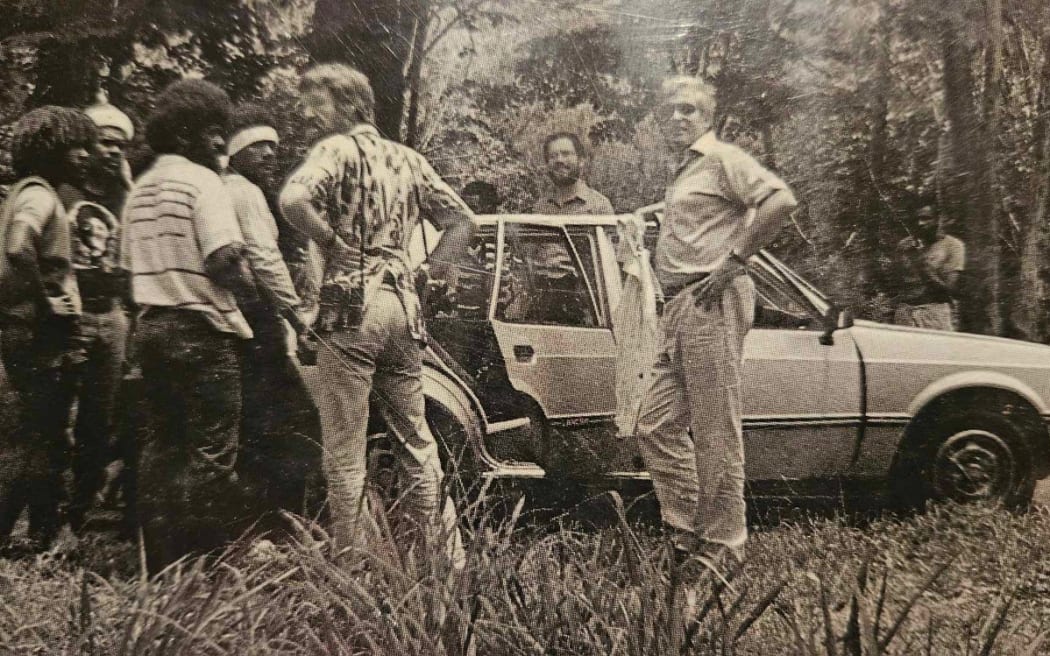This King’s Birthday today, the New Zealand Order of Merit recognises Professor David Robie’s 50 years of service to Pacific journalism and Asia-Pacific media.
He says he is astonished and quite delighted, and feels quite humbled by it all.
“However, I feel that it’s not just me, I owe an enormous amount to my wife, Del, who is a teacher and designer by profession, but she has given journalism and me enormous support over many years and kept me going through difficult times,” he said.
- READ MORE: A journey of faith, language and service: Presbyterian Minister receives ONZM
- Leitualaalemalietoa Lynn Lolokini Pavihi: champion of Vagahau Niue receives MNZM
- Sportspeople recognised in King’s Birthday Honours
“There’s a whole range of people who have contributed over the years so it’s sort of like a recognition of all of us. So, yes, it is a delight and I feel quite privileged,” he said.
Starting his career at The Dominion in 1965, Dr Robie has been “on the ground” at pivotal events in regional history, including the bombing of the Rainbow Warrior in 1985 (he was on board the Greenpeace ship on the voyage to the Marshall Islands and wrote the book Eyes of Fire about it), the 1997 Sandline mercenary scandal in Papua New Guinea, and the George Speight coup in Fiji in 2000.
In both PNG and Fiji, Dr Robie and his journalism students covered unfolding events when their safety was far from assured.

As an educator, Dr Robie was head of journalism at the University of Papua New Guinea (UPNG) 1993-1997 and then at the University of the South Pacific (USP) in Suva from 1998 to 2002.
Started Pacific Media Centre
In 2007 he started the Pacific Media Centre, while working as professor of Pacific journalism and communications at Auckland University of Technology (AUT). He has organised scholarships for Pacific media students, including scholarships to China, Indonesia and the Philippines, with the Asia New Zealand Foundation.
Running education programmes for journalists was not always easy. While he had a solid programme to follow at UPNG, his start at USP was not as easy.
He described arriving at USP, opening the filing cabinet to discover “…there was nothing there.” It was a “baptism of fire” and he had to rebuild the programme, although he notes that currently UPNG is struggling whereas USP is “bounding ahead.”
He wrote about his experiences in the 2004 book Mekim Nius: South Pacific media, politics and education.
Dr Robie recalled the enthusiasm of his Pacific journalism students in the face of significant challenges. Pacific journalists are regularly confronted by threats and pressures from governments, which do not recognise the importance of a free media to a functioning democracy.
He stated that while resources were being employed to train quality regional journalists, it was really politicians who needed educating about the role of the media, particularly public broadcasters — not just to be a “parrot” for government policy.
Another challenge Robie noted was the attrition of quality journalists, who only stay in the mainstream media for a year or two before finding better-paying communication roles in NGOs.
Independence an issue
He said that while resourcing was an issue the other most significant challenge facing media outlets in the Pacific today was independence — freedom from the influence and control of the power players in the region.
While he mentioned China, he also suggested that the West also attempted to expand its own influence, and that Pacific media should be able set its own path.
“The other big challenge facing the Pacific is the climate crisis and consequently that’s the biggest issue for journalists in the region and they deal with this every day, unlike Australia and New Zealand,” he said.
Dr Robie stated his belief that it was love of the industry that had kept him and other journalists going, that being a journalist was an important role and a service to society, more than just a job.
He expressed deep gratitude for having been given the opportunity to serve the Pacific in this capacity for so long.
Moera Tuilaepa-Taylor is manager of RNZ Pacific. This article is republished under a community partnership agreement with RNZ.
The King’s Birthday Honours list (for the Pacific):
To be Officers of the New Zealand Order of Merit:
- The Very Reverend Taimoanaifakaofo Kaio for services to the Pacific community
- Anapela Polataivao for services to Pacific performing arts
To be a Member of the New Zealand Order of Merit:
- Bridget Kauraka for services to the Cook Islands community
- Frances Oakes for services to mental health and the Pacific community
- Leitualaalemalietoa Lynn Lolokini Pavihi for services to Pacific education
- Dr David Robie for services to journalism and Asia-Pacific media education
The King’s Service Medal (KSM):
- Mailigi Hetutū for services to the Niuean community
- Tupuna Kaiaruna for services to the Cook Islands community and performing arts
- Maituteau Karora for services to the Cook Islands community

